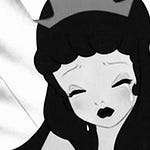PHASE II: The Abyss is Purgatory, and There’s a Tunnel Under Ocean Boulevard
I have been through every stage of the process of this ego death The Weeknd is going through on Hurry Up Tomorrow — especially tracks Drive and The Abyss, so far. My new ego was born in November 2024, only last year. It is only my third ego.
I was saved from the abyss not by force, not by light, not even by love — but by a single moment of clarity. An understanding, quiet and full-bodied, of who I was. I’d been waiting for it, though not consciously. Hoping for it. Because all I could do in those 29 long months was wait. And I hate waiting rooms.
“Heaven’s for those who let go of regret.
And you have to wait here when you're not all there yet.”
— Jim Carrey, Dawn FM
The words of this poem, spoken through an otherworldly narrator, come from a purgatory soaked in regret, narcissism, and love torn to pieces. That album isn’t Abel. It’s the ego — The Weeknd: suave, destructive, guilty, glamorous — dragging lovers down, using them for sex and fame, weaponizing affection, unable to stop. That kind of ego doesn’t die easily. It takes a hell of a battle.
Edven Abel described Dawn FM as an album created around being in purgatory, which Jim Carrey confirmed when he explained why he agreed to be the voice of “the other dimension.”
And after purgatory — when your ego dies again — you don’t get enlightenment. You face the abyss.
The Abyss: The War with a Dying Ego
The abyss never ends. Just so you know. The process to enlightenment is never easy. If you think it is, you’re in denial.
For me, the abyss happened after my ego successfully and painfully died for the second time. When your ego dies — and doesn’t want to — it gets violent. It gets deceitful. And it might try to drag you down with it.
That’s what happened to me. The second ego death was a battle, and it almost took me to hell. Real hell — the internal kind, where nothing makes sense and every thought turns against you.
I won by a thread. I barely scraped out of that war still the “paradise” me. But it was only half of paradise. Definitely not the full picture I was used to. And a silence — the loudest silence I had ever experienced.
The abyss lasted 29 months. It was very dark. And very lonely.
But when you escape it — when you’re finally lifted out — it is a relief. It’s the lifting of some kind of darkness, and I’ve felt it before. I believe it’s the broadening of consciousness.
The kind of moment where you suddenly, subtly, go:
“Oh. I’m out… I’M OUT.”
And when that casual message hits you, it doesn’t feel casual anymore. It feels divine.
I didn’t think I would be pulled out of the abyss without therapy or help. In the abyss, there’s no time. You feel like you could be there forever unless you act. And I didn’t even think about just trusting nature.
I almost gave up completely twice.
One was peaceful, but my will to live was stronger.
The other was long, drawn-out, and confronting.
But I’m still here. It didn’t come to that.
Half a Human: Life After Ego Death
Purgatory was nearly two and a half years — living without a solid identity. But the whole time, I was trying my hardest through art and creativity to retain what I remembered of myself, mostly from before I even knew Jethro.
What follows purgatory isn’t heaven. It’s something more alien. Something quieter.
Like living as half a human.
Your shadow suffers deeply without an ego. They are two sides of the same coin. They work together — or they don’t.
My shadow went completely silent after my ego died.
She and I have done a lot of work to rebuild trust, but our relationship is still dysfunctional. I go into denial often — until someone or something rips me out of it. I cry for my shadow often, in remorse for how I treated her.
I’ve made huge amends through shadow work, which still continues. It was a brutal two years of work, but it changed me.
My shadow felt lost without the ego. I had blamed her for everything. Lied to her. Shut her down. And now she wouldn’t come forward anymore. She refused to participate.
So I was left alone with my little child.
The inner child — the first self. The one who remembers everything, even when we forget. She’s tiny but impossibly wise. We sat together in silence, waiting.
Shadow Work: From Chaos to Compassion
Shadow work isn’t a trendy self-care practice. It’s war.
In my twenties, I made my shadow drive. She didn’t know how to drive, but I forced her behind the wheel. Meanwhile, my ego — loud, deranged, terrified — screamed directions from the passenger seat.
I, the “self,” hid in the back seat. Dissociating. Cowardly. Just trying not to die.
And I tied up my little child, locked her in the back room of my psyche, thinking I was protecting her. But I was silencing her. Isolating her. For fifteen years.
After my first awakening, things started to heal. I untied her. I apologized to my shadow. My ego was reborn — quieter, more humble.
Then entered Jethro.
And with him, my old ego.
The war began again — not just with the ego, but with the shadow.
Two wars. Two fronts.
I had let my shadow be abused. I hadn’t defended her. But over time, it stopped being war and became something else: accountability.
I began to listen.
To apologize deeply.
To learn how to drive the car myself — with shadow in the passenger seat, ego in the back, and child held in my arms.
I am no longer at war.
My shadow? She’s slowly, cautiously, healing.
Jethro Cave: The Ego I Killed and the Man I Loved
Jethro was my ego — and a real human being I loved more than anyone.
He came back after my first ego death to war with me again, as if returning to ensure the final death happened properly.
That war was punishing. But it also gave me beautiful things. Even the pain was beautiful.
We were twin flames, yes — but also trauma-bonded. He, unintentionally. Me, very much on purpose. I spun a web to keep him tethered to me out of revenge. It was immature. I earned bad karma for it.
We both paid the price.
But as Taylor Swift said:
“It was war, it wasn’t fair.” (The Great War, Midnights 3am Edition)
I don’t miss Jethro anymore.
Not like people miss the dead.
After real mourning — the kind where you scream into your pillow wondering why they can’t just text you again — something changed.
The grief alchemized.
Not into closure. Not into detachment.
But into quiet reverence.
He is now a permanent echo. A part of me that once was. A part of me that helped build a small, impossible world.
A world that, I once believed, we’d grow old in together.
Maybe we did evolve. Maybe that was the evolution.
And I was left on my own again.
Not in a poor-me way. Just… as a fact.
The Signs, The Music, and the Mythic Ego
I tend to get intense messages and signs — ones that change everything. But I take so long to understand them, they often hit after the moment they’re meant for.
They come in a language I can speak — but can’t always interpret. They arrive like dreams. Saturated in symbols, colours, sensations.
It’s always in hindsight that I understand them best.
And that’s exactly how I’ve come to understand Tunnel Under Ocean Blvd.
When I first heard it, I knew it mattered. But only now — after Drive and The Abyss — do I understand what it's really saying.
The tunnel. The manmade walls.
“Don’t forget me.”
They’re not just lyrics. They’re psychic architecture.
The tunnel is the soul.
The walls are the animus — the masculine ego.
The voice repeating “Don’t forget me” is the ego, begging not to be erased.
The same theme runs through Summertime Sadness:
“Movin’ down the coast, goin’ ’bout 99 (kms)
Got my bad baby by my heavenly side
I know if I go, I’ll die happy tonight.”
That’s Drive, isn’t it?
It’s the ego. The thrill. The death drive.
And in the Drive music video, the woman drives. Abel is kidnapped, held in a surreal house.
They say your home reflects your mind.
If that’s true, Abel is not in a good place.
It’s possible he's fighting two egos: The Weeknd and the feminine ego represented by Lana — who, in Summertime Sadness, may not be dying, but killing herself as ego. Influencing the human to kill the persona.
Maybe Drive, The Abyss, Tunnel, and Summertime Sadness are chapters of a metaphysical opera.
And maybe I’ve been living that same opera, too.
The Poem Before Everything Fell Apart
Before everything had happened — before Jethro’s death, before the second ego death, before my shadow went quiet — my little child had written me a poem. I don’t remember exactly what triggered it, but I know she wrote it for me, and for him.
The poem was about letting go of Jethro, about shedding anything the ego was tied to. She was telling me it’s okay to let go. That we could survive the pain. That we didn’t need to carry the weight anymore.
She told me we would fight the good fight together, said something about falling down the snakes and climbing up the ladders.
And it ended with her saying:
“And one day we will die peacefully together and go to heaven.”
It was a beautiful and sad little poem. I sent it to Jethro before he died.
I can’t be sure if he ever read it.
A part of me hopes he didn’t — because it might have indicated to him that I was choosing a different path. A path that wasn’t him.
I shall never know now, anyway.
Brought to you by A Nunz Rezentment Productions PTY LTD
copyright Danica Conwell 2025 All Rights Reserved
Proofread by chat GPT
Pictures by Pinstrest
Gifs by GIPHY
PLease like, comment, share or subscribe
LoveCultz
















Share this post